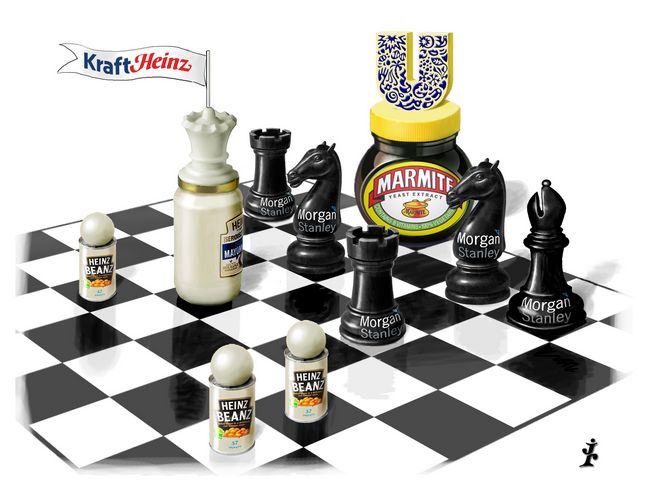Corporate protector
For successfully defending businesses such as Unilever from unwanted approaches, and maximising prices when a bid made sense, as well as advising on some of the most significant strategic acquisitions that have been completed in the past 12 months, Morgan Stanley is IFR’s M&A Adviser of the Year.
Morgan Stanley has long prided itself on being the premier house for significant listed companies seeking to defend themselves from unwanted bids. “The goal of our practice is to defend businesses – not just earn fees,” said Rob Kindler, global head of M&A at the US bank.
The past year saw the bank’s credentials severely tested when Unilever faced a US$143bn takeover offer from Kraft Heinz in February.
The audacious move for the Anglo-Dutch consumer goods conglomerate, with a market capitalisation of £100bn prior to the approach, required a different response from that normally given by smaller targets.
“Unilever had never expected to be the subject of a bid,” said James Allison, head of M&A and treasury at the company.
The board had to decide rapidly how to respond to this unique situation. Like many large corporations, Unilever was familiar with the potential options, having used many of the major banks and boutiques to advise it on acquisitions. Selecting which was best placed to help on this vital assignment was critical.
In addition to its corporate brokers UBS and Deutsche Bank, the company chose two principal advisers to defend itself, Morgan Stanley and Centerview Partners. They proved excellent at counselling chief executive Paul Polman and his team on keeping the company independent.
It was important not to have too many voices in the room.
“Centerview specialises in advising boards on strategy. Morgan Stanley has considerable investment banking and capital markets experience with outstanding strength in depth. Together, they provided the support we needed and they worked well together,” said Allison.
Kraft Heinz’s tentative offer was outlined on Friday February 17 at 12:24pm London time, after a leak to the media. But after an intense two days of debate, at 5:31pm on the following Sunday both sides put out a joint statement saying Kraft Heinz had agreed to withdraw its approach.
Morgan Stanley’s experience in this area had paid off. “While executives can understand the rationale for an approach you do rely on the experience of advisers who have dealt with takeover defences in the past,” said Allison.
Morgan Stanley’s head of M&A in EMEA, Colm Donlon, said the bank’s team is close-knit, meaning its members have built up significant experience of such defence mandates, many of which are successfully batted away before ever being unveiled publicly.
“Although it all happened very quickly, this was not an ill-considered approach and the company had to make a decision to rebuff it swiftly and firmly,” he said.
Morgan Stanley’s team in this instance was very well placed to help. It was led by Henry Stewart, head of consumer and UK investment banking. The previous year he had advised brewer SABMiller on the approach by AB InBev, which was backed by 3G, the same Brazilian investor behind Kraft Heinz.
Morgan Stanley was also able to draw on the services of Mark Rawlinson, former head of the M&A practice at law firm Freshfields. He had advised InBev on the SABMiller bid and was intimately aware of its tactics.
DETERING PREDATORS
The firm soon realised that Warren Buffett’s position as a major investor in Kraft Heinz, alongside 3G, would prove critical for the success of the bid. Buffett had made a point of never wanting to go hostile.
Unilever deployed former Citigroup adviser Michael Klein, who now acts individually, to ascertain if this was still the case. “Michael Klein was also helpful in the process because of his proximity both to Unilever and to Warren Buffett,” said Allison.
Once it was clear that Buffett was reluctant to sign off on aggressive tactics the deal could be more comfortably headed off. But once the formal agreement to drop the offer had been published, Morgan Stanley still had to ensure Unilever bolstered its defences to justify its independence to shareholders.
“We brought forward plans to increase shareholder returns,” said Allison. Morgan Stanley helped in this process too, analysing the balance sheet.
“We also decided to increase leverage,” said Allison. “Our comparatively under-leveraged balance sheet had helped the bidder to obtain acquisition financing.”
After a review from Morgan Stanley, the company agreed a €5bn share buyback programme, committed to raise its divided by 12%, started the sale of its spreads business, which could be worth more than US$7bn, and announced plans to improve efficiencies throughout the business and lift margins.
Kraft Heinz’s initial offer was an 18% premium to Unilever’s undisturbed share price. The shares are now 26% above the latter level, indicating that the company’s actions, as advised by Morgan Stanley, have paid off.
LEVERAGING UP
Leverage dominated the past year, with private equity firms being more active in M&A processes than in 2016 and making the most of the easy credit markets. The total value of transactions with private equity involvement was US$579bn, nearly a third higher than the previous year.
Morgan Stanley’s most prominent transaction in this area was the sale of 61% of long-term client National Grid’s gas distribution business for US$4.55bn to a consortium of seven infrastructure investors, including Macquarie Infrastructure and Real Assets as well as Chinese and Qatari sovereign wealth funds.
An impressive price of 159% of regulatory asset value was achieved. The firm was also a bookrunner on an accompanying £3.6bn bond issued in connection with this divestment. It also advised stationery retailer Staples on its US$6.9bn leveraged buyout by Sycamore Partners.
However, within the awards period to November 15 2017, the total value of all completed M&A deals fell by 13.3% to US$2.96trn, according to Thomson Reuters data. The occupants of the top four spots in this table did not change but all experienced larger-than-average declines of around 30%.
The Unilever work, like other successful defence transactions, is not recorded as a completed deal in these rankings, meaning that Morgan Stanley misses out on US$143bn of credit. That it still racked up a completed deal tally of US$745bn is therefore even more impressive.
The bank was involved in 13 major campaigns against activist shareholders, acting for clients Procter & Gamble, ADP, and Bristol-Myers Squibb, among others.
With its defence activities very much the bank’s calling card, Morgan Stanley works hard to prepare clients for a possible attack – even ahead of any such moves.
“We now make a point of preparing them for possible defences by running past them deliberatively provocative scenarios,” says Donlon.
MAJOR TRANSACTIONS
Morgan Stanley was also present in seven of the 10 largest transactions that were completed during the period. All were over US$20bn.
It advised Dow Chemical, alongside Michael Klein and Lazard, on the US$68.5bn merger with DuPont. First announced in December 2015, it took just over 20 months to consummate.
The transaction was sizeable but relatively simple, with few surprises emerging during their execution.
The acquisition of Syngenta for US$43bn by ChemChina was more complicated. Morgan Stanley was one of several firms acting for the bidder, which emerged as a white knight after Monsanto’s approach for Syngenta was rebuffed.
Morgan Stanley was sole adviser to Microsoft on its US$26.2bn acquisition of LinkedIn.
The bank also acted on the buyside during the sale of oil services provider Baker Hughes to GE Oil & Gas for US$31.7bn. This complex tax-inspired move was an “Up-C” transaction and the biggest ever in this space.
“No one knew how the strategy would play in the market,” said Susan Huang, head of Americas M&A at Morgan Stanley. “It was a bold move in an industry that has been very volatile.”
To see the digital version of this review, please click here.
To purchase printed copies or a PDF of this review, please email gloria.balbastro@tr.com.



